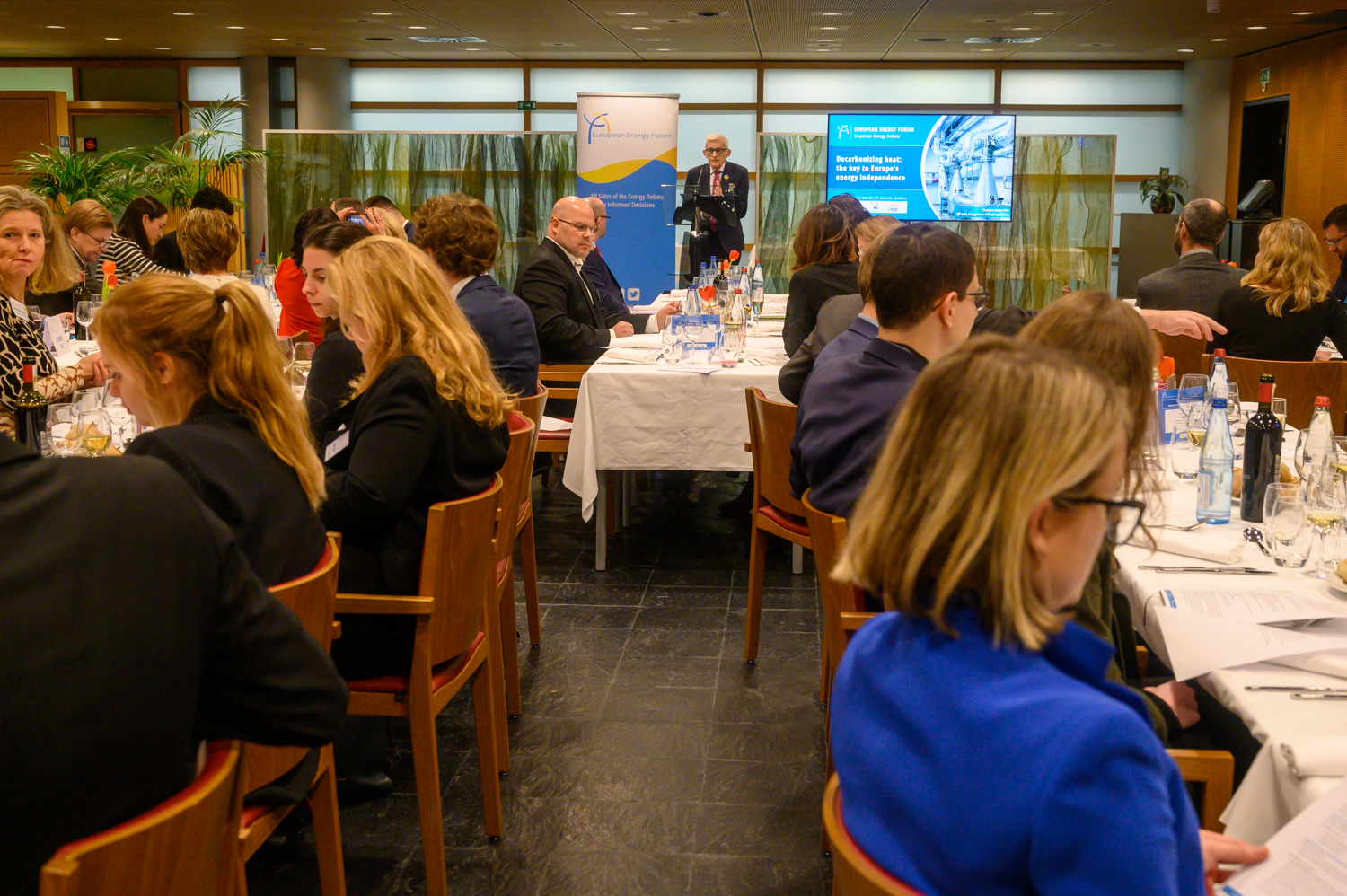Decarbonizing heat: the key to Europe’s energy independence
Chaired by Jerzy Buzek MEP, President of the EEF
Speakers:
Aurélie Beauvais, Managing Director, Euroheat & Power
Hans Korteweg, Managing Director, COGEN Europe
Wanda Buk, Vice-President, PGE
Olivier Racle, Member of the Board, Euroheat & Power
Radan Kanev MEP, Active Member of the EEF
This EEF energy debate was an opportunity to discuss the potentials, needs and challenges that the heating sector faces in its pathway to decarbonization with a view to support Europe’s energy independence.
Jerzy Buzek MEP (EPP, Poland), President of the EEF opened the discussion by underlining the fundamental importance of the heating sector, and specifically of district heating systems, that cover a consistent share of heat supply in the EU, especially in Central, Eastern and Scandinavian countries. Mr Buzek highlighted how dealing with this topic is relevant both for ensuring a just energy transition and affordable energy bills for consumers. Besides, the decarbonization of district heating and cooling (DHC) and cogeneration – still largely based on fossil fuels – will not only contribute to the achievement of EU’s climate goals, but also to its independence from energy imports.
Aurélie Beauvais, Managing Director at Euroheat & Power explained that heating and cooling currently represent 50% of the energy demand in the EU and that roughly 60 million EU citizens are relying on the DHC infrastructure. The technology still largely relies on fossil fuels (mainly natural gas 42%) and decarbonization of this sector is key. To face this challenge, Ms. Beauvais emphasized the need for a multi-energy approach, which supports, in addition to the uptake of renewable electricity sources, other clean and sustainable non-electric sources. Diversification is critical also for energy security and resilience. She recalled that DHC systems are an inclusive energy technology that can rely on many sources: hydrogen, sustainable waste heat recovery, biomethane, or power to heat. These can allow an affordable energy transition suitable to the diversities of regions. Ms. Beauvais insisted that ambition and consistency in EU legislation are very much needed.
Hans Korteweg, Managing Director at COGEN Europe, shared information on the application of cogeneration in district heating but also as micro-cogenerations in buildings. He argued that combined heat and power (CHP) is a future-proof and efficient solution using fuel to provide simultaneously heat and electricity . This solution is agnostic, using different energy sources such as gas but also biomass, renewable gas, hydrogen, waste heat, geothermal, solar thermal. This aspect is key in terms of scarcity of resources and prices. Mr Korteweg explained that the electrification of buildings is a solution but progressively becoming a challenge. For this reason, it is crucial to diversify the mix of solutions and to consider cogeneration and district heating as complementary to electrification in the energy transition, and not in competition. Finally, he stressed that policymaking should also focus on supply-side efficiency and not only on final energy savings, and that it should recognize the importance of sector coupling solutions in producing flexible power in times of peak demand.
Wanda Buk, Vice-President at PGE, underlined there is a need, in Poland, to invest on already available and viable technologies and sources such as natural gas, because this in due time can be replaced by hydrogen and because of the challenges that go beyond the replacement of the source itself. Decarbonisation cannot occur overnight: both companies and building owners must play a role in upgrading the heating chain. While agreeing with the general requirement for “zero-emission buildings”, Ms Buk argued that the ambitious amendments to the EPBD adopted by the ITRE Committee in its report are not currently feasible. She insisted that one should not lose the potential of the existing infrastructure, protect the citizens from higher costs and also protect the industry.
Olivier Racle, Member of the Board at Euroheat & Power focused on France that intends to double the number of district energy systems in the near future. In particular, he highlighted how the heating crisis and volatility of gas prices have led to a shift in the paradigm of activity. He pointed out how the integration of multiple energy sources will be the answer to meet energy efficiency and renewable targets. He illustrated his points by focusing on three examples of French “eco-districs” (Limeil-Brevannes, Meudon and Véligeo) which have progressively exploited increasing shares of renewable or carbon-neutral sources such as solar thermal, thermal storage, biogas, biofuels and geothermal.
Radan Kanev MEP (EPP, Bulgaria), Active Member of the EEF, rapporteur on EPBD in ENVI said that in Bulgaria, even a partial decarbonisation can play a decisive role in reducing the country’s energy dependence because about 50% of national gas consumption is for central heating of three towns. However, Mr. Kanev also emphasised the difficulties in decarbonising such a huge and strongly centralised DHC system, especially due to the risk of price increases and thus low public support. He pointed the geothermal potential of his country and considered that combined energy sources using geothermal and thermal storage could represent a significant solution.
The Q&A session offered the opportunity to exchange views on various aspects concerning the decarbonization of DHC and cogeneration including experiences from different countries in Europe in DHC. In particular, the discussion focused on the need for a strong regulatory framework – discussing the EPBD, EED and RED legislations-, buildings renovations, diversification of energy sources and the potential role played by hydrogen in DHC and cogeneration.



